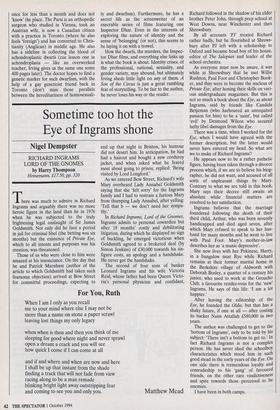Sometime too hot the Eye of Ingrams shone
Nigel Dempster
RICHARD INGRAMS LORD OF THE GNOMES by Harry Thompson Heinemann, f17.50, pp. 320 There was much to admire in Richard Ingrams and arguably there was no more heroic figure in the land than he in 1976 when he was subjected to the truly frightening legal onslaught of Sir James Goldsmith. Not only did he face a period in jail for criminal libel (the betting was six months) but the existence of Private Eye, which to all intents and purposes was his creation, was threatened.
Those of us who were close to him were amazed at his insouciance. On the day that he and Patrick Marnham (author of the article to which Goldsmith had taken such fearsome objection) arrived at Bow Street for committal proceedings, expecting to end up that night in Brixton, his humour did not desert him. In anticipation, he had had a haircut and bought a new corduroy jacket, and when asked what he feared most about going to prison, replied: 'Being visited by Lord Longford.'
As we entered Bow Street, Richard's wife Mary overheard Lady Annabel' Goldsmith saying that she 'felt sorry' for the Ingrams family and I had to restrain a furious Mary from thumping Lady Annabel, after yelling: `Tell that b — we don't need her sympa- thy.'
In Richard Ingrams, Lord of the Gnomes, Ingrams admits to personal cowardice but after 18 months' costly and debilitating litigation, during which he displayed no sign of buckling, he emerged victorious when Goldsmith agreed to a brokered deal (by Simon Jenkins) of £30,000 towards his six- figure costs, an apology and a handshake. He never got the handshake.
The second of four sons of banker Leonard Ingrams and his wife Victoria Reid, whose father had been Queen Victo- ria's personal physician and confidant, Richard followed in the shadow of his elder brother Peter John, through prep school at West Downs, near Winchester and then Shrewsbury.
By all accounts TY treated Richard rather badly, but he flourished at Shrews- bury after PJ left with a scholarship to Oxford and became head boy of his house, editor of The Salopian and leader of the school orchestra.
As everyone must now be aware, it was while at Shrewsbury that he met Willie Rushton, Paul Foot and Christopher Book- er, and they were to become the nucleus of Private Eye, after honing their skills on vari- ous undergraduate magazines. But this is not so much a book about the Eye, as about Ingrams, said by friends like Candida Betjeman (who harboured an unrequited passion for him) to be a 'saint', but called `evil' by Desmond Wilcox who secured hefty libel damages from the Eye.
There was a time, when I worked for the Eye, when I would have agreed with the former description, but the latter would never have entered my head. So what are we to make of Richard Ingrams?
He appears now to be a rather pathetic figure, having been taken through a divorce process which, if we are to believe his biog- rapher, he did not want, and accused of all sorts of unpleasant things by Mary. Contrary to what we are told in this book, Mary says their decree still awaits an absolute while financial matters are resolved to her satisfaction.
Ingrams believes that the marriage foundered following the death of their third child, Arthur, who was born severely handicapped and died aged seven, after which Mary refused to speak to her hus- band for many months and he went to live with Paul Foot. Mary's mother-in-law describes her as 'a manic depressive'.
She now lives with her Pekinese, Harry, in a bungalow near Rye while Richard remains at their former marital home in the Berkshire village of Aldworth with Deborah Bosley, a quarter of a century his junior, who used to work at the Groucho Club, a favourite rendez-vous for the 'new' Ingrams. He says of this life: 'I am a lot happier.'
After leaving the editorship of the Eye, he founded the Oldie, but that has a shaky future, if one at all — after costing its backer Nairn Attallah £580,000 in two years.
The author was challenged to get to the `bottom of Ingrams', only to be told by his subject: 'There isn't a bottom to get to.' In fact Richard Ingrams is not a complex person. He has never shed the schoolboy characteristics which stood him in such good stead in the early years of the Eye. On one side there is tremendous loyalty and comradeship to his 'gang' of favoured friends, on the other rare vindictiveness and spite towards those perceived to be enemies.
I have been in both camps.


























































 Previous page
Previous page